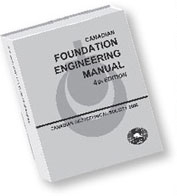

The Canadian Geotechnical Society
About the CGS
À Propos de la SCG
Organization
Students & Young Professionals
Awards & Honours
Étudiants
Prix et conférences d’Honneur
Section des membres
Galerie de photos
Devenir Membre De la SCG
Avantages des membres de la SCG
- un accès en ligne à la Revue canadienne de géotechnique et Géotechnique canadienne - Le périodique de la SCG
- un accès en ligne aux principales conférences spéciales
- des prix réduits pour l’inscription à la conférence annuelle de la SCG, et les autres conférences de la SCG
Sections
Divisions
Committees
Other Internal Groups
Sections
Divisions
Comités
les Autres groupes internes
Resource Centre
Canadian Foundation Engineering Manual
Geotechnical News
Canadian Geotechnical Virtual Archives
Canadian Foundation Engineering Manual
The Canadian Foundation Engineering Manual is published by the CGS

The 4th Edition was released in English in 2006 and in French (as Manuel canadien d'ingénierie des fondations) in 2013.
The 4th Edition can be purchased through Karma-Link Management Services Ltd. CGS members receive preferred pricing. This edition is now only available in English.
The 4th Edition can be purchased through Karma-Link Management Services Ltd. CGS members receive preferred pricing. This edition is now only available in English.
- Table of Contents of the 4th Edition (English)
- Errata to the 4th Edition (English)
Centre de ressources
Manual Canadien d’ingéniere des fondations
Geotechnical News
Archives Géotechniques virtuelles canadiennes
- Aperçu
- Historique de la SCG
- Historique de la géotechnique canadienne
- Contributeurs à la géotechnique canadienne
- Contributeurs individuels
- Groupes de contributeurs
- Recits de vie (mémoires)
- Légendes canadiennes
- Projets géotechniques canadiens
- Women in Canadian Geotechnique
- Conférences, références, etc.
Manuel canadien d’Ingénierie des fondations
Le Manuel canadien d'ingénierie des fondations est publié par la Société canadienne de géotechnique.

La quatrième édition a été publiée en anglais (sous le titre de Canadian Foundation Engineering Manual) en 2006 et en français, en 2013.
La quatrième édition peut être achetée par le biais de Karma-Link Management Services Ltd. Les membres de la SCG bénéficient de prix préférentiels.
La quatrième édition peut être achetée par le biais de Karma-Link Management Services Ltd. Les membres de la SCG bénéficient de prix préférentiels.
- Table of Contents of the 4th Edition (English)
- Errata to the 4th Edition (English)









